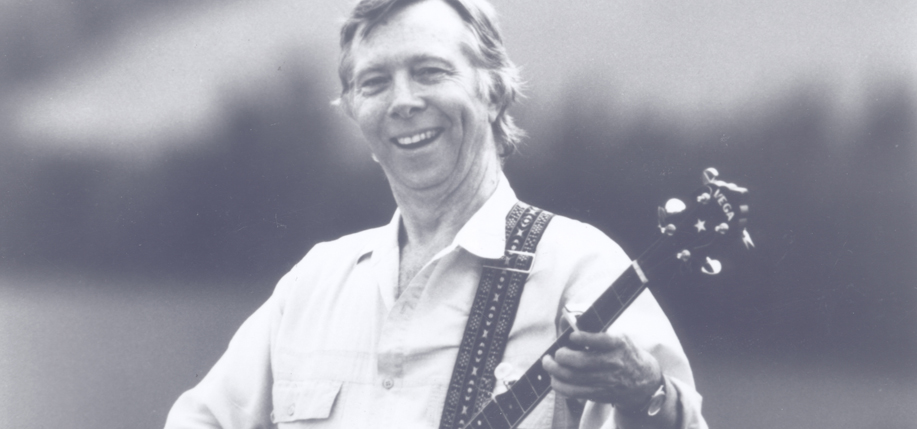When Tommy Makem died on August 1,the worldlost not only a great musician and storyteller but an original thinker, who was passionate about Ireland, and unfailingly gracious. We’ll not see the likes of him again.
It was a coincidence, of course, that legendary folk singer Tommy Makem and hotel mogul Leona Helmsley departed this world within two weeks of each other last August. While the two had nothing in common other than their humanity, I can’t think of Tommy without thinking of Helmsley. Odd? Not if you were listening to Tommy 15 years ago, when he routinely worked Helmsley into his rendition of “Isn’t It Grand, Boys.”
I can see it and hear it now: Tommy on the stage at his restaurant in midtown Manhattan, banjo slung across his chest, Ronnie D’Addario playing in the background, and a standing-room-only crowd knowing exactly what was coming and loving it all the same. He’d break into that wonderful Irish song about the charms of being dead, and he’d work his way to the verse about the woman left behind:
Look at the widow,
Leona Helmsley!
Isn’t it grand, boys,
To be bloody well dead.
I must have heard Tommy sing that verse a dozen times back in the days when Helmsley was dubbed the “Queen of Mean,” and it never failed to crack me up. It still does all these years later. It reminds me of Tommy Makem’s irreverence, his politics and his common touch.
Tommy died in early August of lung cancer at the age of 74. A native of County Armagh, Tommy rose to fame when he hooked up with the Clancy brothers of County Tipperary in New York in the mid-1950s. They all wanted to be actors; they found their calling in music. As every fan knows, the Clancy Brothers and Tommy Makem hit the big time on the Ed Sullivan show in 1961 and went on to revolutionize Irish music on both sides of the Atlantic. Tommy left the Clancys in 1969 to pursue a solo career, but reunited with Liam Clancy in 1975. They toured and recorded together until 1988.
Reared in a household that had put Ireland in the distant past, I was a latecomer to the Clancy and Makem phenomenon. But once Tommy got my attention in the mid-1980s, I was hooked. I’m not qualified to tell you about his competency on the banjo or the penny whistle, but I know a storyteller when I hear one. And more than anything else, Tommy was a storyteller. His most famous story was, of course, the ballad “Four Green Fields,” and if you never heard him sing it in person, you missed something special. But he understood that every song was a story, and he knew how to convey its plot, its characters, and its message. It didn’t matter whether he wrote the song or not. His great baritone and impeccable timing turned even the slightest song into a story worth hearing.
I would hardly claim to have been a friend of Tommy Makem, but I knew him a bit, in part thanks to a piece I wrote for this magazine when he and Liam Clancy played their last concert together in 1988 at Stonehill College in Massachusetts. I moved to Manhattan at around the same time, and wound up working just a few blocks from Tommy Makem’s Irish Pavillion, his bar-restaurant on East 57th Street. It became a home away from home, and if memory serves (and it doesn’t always), I probably saw Tommy play at the Pavillion five or six times a year. He was unfailingly gracious and always made mention of the piece I wrote in Irish America. But in person, he was not the outsized personality he appeared to be on stage. Quiet and thoughtful, he once got me into a conversation about Michael Harrington’s famous book, The Other America, which explored poverty in America in the early 1960s.
Tommy’s politics were not hard to figure out. Let’s put it this way: He lived in New Hampshire, but voted (unless I miss my guess) as if he lived in Vermont. Unlike many entertainers, however, he was never in his audience’s face, he was never self-righteous, and he never seemed to believe that he had all the answers. He preferred humor to sermonizing, but you got his point. Leona Helmsley wasn’t the only powerful person to be satirized on stage at the Irish Pavillion. So were President George H.W. Bush and Tommy’s fellow New Hampshire resident, John Sununu Sr.
I regret that I didn’t get to know Tommy better, and earlier, but I’m glad I caught him when I did. Back in 1988, Tommy’s wife Mary told me that he never seemed more relaxed and more energized than when he was on stage at the Pavillion. Considering how much time I spent there from the early 1980s until it closed several years ago, I take comfort in knowing that I heard Tommy in a place he loved so well.
Best of all, I can still hear him, even now. ♦


tommy makem was a good man his love and passion like a true irish man